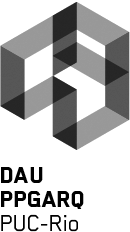>Undergraduate
Curriculum
The Curriculum of the Undergraduate Program in Architecture and Urbanism at PUC-Rio is composed of courses in General Education, Representation and Expression, Technology, Design, Elective Courses and Religion.
The curriculum’s structure and detailed course descriptions can be found at the following link:
CURRICULUM - UNDERGRADUATE PROGRAM IN ARCHITECTURE AND URBANISM - PUC-Rio
The group of courses in General encompass Modern and Contemporary Cultures, Introduction to the Profession of the Architect, Theory and History of Architecture, History of Architecture in Brazil, History of Cities, Urban Planning, Urban and Regional Planning, Aesthetics, Social-Anthropological Studies, Environment and Sustainable Development and Economics.
The disciplines of Representation educate students in the skills necessary for the expression of design activity, such as: Observation Drawing, Descriptive Geometry, Architecture Design (including digital applications), Foundations of Visual Language Production and Critical Writing and Text Comprehension.
In the Technology group are included, in the form of individual courses and workshops in different design studios, the necessary knowledge in Mathematics and Spatial Geometry, Calculus, Physics, Environmental Comfort, Topography, Ergonomics, Structural Systems, Geotechnical Engineering, Construction, Planning Control and Construction, Building Materials, Construction Techniques and Architectural and Urban Infrastructures.
Foundation courses in Religion are offered in the following subjects: Man and the Religious Phenomenon, Christianity, Christian Ethics and Professional Ethics, and aim at contributing to students critical understanding of the role of the architect in society.
The Design group is based on a pedagogical model of integrated studios that consider design as a process of cooperation between several disciplines. All studios are organized around two main streams, foundational knowledge and complementary contents, which are coupled throughout each term by design instructors and other faculty. Each design studio deals with varying fields of activity covering specific segments of the practice of architecture and urbanism, and include: Introduction to Design, Housing, Work Spaces, Public and Collective Spaces, Restoration and Revitalization, Urban Design, and Independent Thesis Project.
Design education in the program, while exercising the research and practice, encourages students and faculty to investigate current trends and subjects that are relevant to the field. The participation of faculty from different areas, sharing content and developing new skills, aims at achieving effective integration between theory, practice, creativity and critical thinking.
The curriculum extends the concept of academic activities by enabling the recognition of Complementary Academic Activities relevant to the students to acquire the knowledge and skills necessary for their formation, and establishes the Internship Program, which allows students to pursue professional experiences outside the University.

